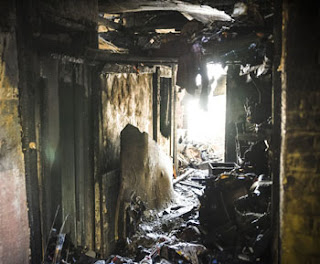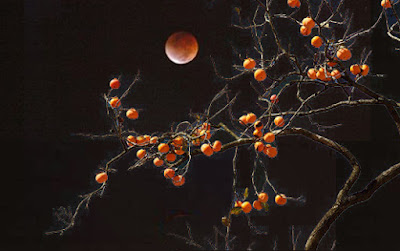
When the First World War officially ended June 28, 1919, the actual fighting had already stopped the eleventh hour of the eleventh day of the eleventh month the previous year. Armistice Day, as it was known, later became a national holiday, and in 1954 (the year I graduated from high school), the name was changed to Veterans Day to honor all U.S. veterans of all wars.
The only veteran of that war, “the war to end all wars,” I ever knew was my father’s step-father Benjamín Armijo, from New Mexico, an old man who seldom spoke and whom I would on occasion see wearing his cap of the American Legion. (He was also Republican.)
 “The war to end all wars” was anything but that and when I was not much more than five, three of my uncles on my mother’s side (Roberto, Armando, Enrique) went off to fight another war, the Second World War.
“The war to end all wars” was anything but that and when I was not much more than five, three of my uncles on my mother’s side (Roberto, Armando, Enrique) went off to fight another war, the Second World War.
I missed my uncles and remembered them by their photos on my grandmother’s home altar, very handsome in their uniforms; in the endless rosaries and litanies the women in the family regularly met to pray; and in the three blue stars that hanged in the window.
My uncle Roberto, tío Beto, did not last his second year; he came home and ulcers and los nervios, nerves, were mentioned. My uncle Armando, tío Pana, in the Infantry division or the Cavalry Division (though not one horse was ever ridden into battle in that war), served in the Pacific Theater, and Guadalcanal is a name that in some way sticks in his history. My uncle Enrique, tío Kiki, the youngest, in the Airborne Division, the “Screaming Eagles,” served in the European Theater and parachuted into the taking of Germany.
After that war ended, they came home, tío Pana into a hospital, sick with malaria which affected him throughout the rest of his life; tío Kiki with a malady in the soul not so easily diagnosed, hidden in his quiet humor, gentle ways. All my uncles were gentle men, in all senses of the word. And Beto, Pana, Kiki spoke not at all about their experiences of war in spite of my curiosity and questions which they diverted with a little joke or change of subject. What they had seen, felt was apparently not to be spoken and the family sensed this and respected their reticence. Neither of them joined the Veterans of Foreign Wars that I ever knew.
 Enrique González Prieto
Enrique González Prieto
The Korean War “broke out”, as they say, as if it were acne, not long after. But as for me, I have never fought in any war, though I joined the U. S. Navy upon graduating from El Paso High School to become a Hospital Corpsman and obtain the G.I. Bill with which to enter Pre-Med studies upon my discharge; two of four years in the Navy I spent in the Marine Corps with the rank of Staff Sergeant. The Korean War had already ended. And though I served closely enough to it to be given the Korea Defense Service Medal and am legally a veteran and eligible to join the VFW, I never did nor do I intend to.
If I consider myself veteran of any war, it would be of the Viet-Nam War, not because I fought in it, far from it, but because I struggled against it. (I counseled conscientious objectors, picketed recruiting offices, marched in the streets.) The war veterans I have most intimately known are from that war, many, if not most, wounded and ill in body (from bullets, shrapnel, agent-orange), wounded and ill in the soul (terror, guilt, shame, hatred putrefying their dreams, tainting their loves.)
I am leery of being asked to honor veterans of almost any war, except as I honor the suffering, the being of every man or woman who ever lived. I am sick of “patriotism” behind which so many scoundrels hide. I am sick of war that has stained almost every year of my life. Given that almost every war the U.S. has waged and wages are invasions of other countries justified with thin pretensions of "defense," I am impatient with fools who ask whether I “support our troops.”
What does it mean to “support our troops”? What is a troop but a herd, a flock, a band? What is a troop but a group of actors whose duty it is not to reason why, but to do and die? In the years I served in the Navy and Marine Corps as a medic, I never took care of a troop; I took care of men who had been wounded and hurt, who cut themselves and bled, who suffered terrible blisters on their feet from long marches, who fell ill sick with high fevers. If to support means to carry the weight of, keep from falling, slipping, or sinking, give courage, faith, help, comfort, strengthen, provide for, bear, endure, tolerate, yes, I did, and do support all men and women unfortunate enough to go to war.
Troops, I do not. If to support means to give approval to, be in favor of, subscribe to, sanction, uphold, then I do not. The decision to make war was/is not theirs to make; troops are what those who make the decisions to war use (to kill and to be killed, to be brutalized into torturers) for their own ends, not for ours, certainly not for the sake of the men and women who constitute the “troops.”
Indeed, I find the question whether I "support our troops" offensive, cynical, hypocritical given that we care so little for our veterans: so many are homeless; find no work; have little care for their wounds, physical and psychological; little for their addictions; many are in prison; a great many commit suicide. This acknowledged, the "patriotism" the question pretends is hollow and blind.
I honor veterans of war the only way in which I know how to honor: with compassion; with respect; with understanding for how they were/are used, misled, indoctrinated, coerced, wasted, hurt, abandoned; with tolerance for their beliefs and justifications; with efforts to see that their wounds, of body and of soul, are treated and healed, their suffering and sacrifice compensated. I never refuse requests for donations to any veterans’ organization that seeks benefits and services for veterans. I honor veterans, men and women; not bands, not troops.
If you look to my window on this day, the flag you will see hanging there will be the rainbow flag of peace. It hangs there in honor of every veteran of any war of any time or place. Indoors, I will light a candle and burn sage, recommit myself to the struggle for justice and for peace. Such is the only way I know in which to honor the veterans (and victims military or civilian) of war.Berkeley, November 11, 2007
© Rafael Jesús González 2021
 bandera uiversal de la justicia y la pazUniversal Justice & Peace Flag Universal Justice & Peace Flag is licensed under a Creative Commons Attribution-ShareAlike 4.0 International License.
bandera uiversal de la justicia y la pazUniversal Justice & Peace Flag Universal Justice & Peace Flag is licensed under a Creative Commons Attribution-ShareAlike 4.0 International License.Día del Veterano
Cuando la Primera Guerra Mundial oficialmente acabó el 28 de junio 1919, la lucha actual ya había cesado en la oncena hora del onceno día del onceno mes del año anterior. Día del Armisticio, como fue conocida, más tarde se hizo fiesta nacional, y en 1954 (el año en que me gradué de la secundaria), el nombre se le cambió a Día del Veterano para honrar a todo veterano estadounidense de todas las guerras.El único veterano de esa guerra, “la guerra para acabar con toda guerra,” que jamás conocí era el padrastro de mi padre, Benjamín Armijo, de Nuevo México, un hombre anciano que raras veces hablaba y a quien en ocasión veía llevar la gorra de La legión Americana. (Era también republicano.) “La guerra para acabar con toda guerra” fue todo menos eso y cuando yo tenía no mucho más de cinco, tres de mis tíos maternos (Roberto, Armando, Enrique) salieron a pelear en otra guerra, la Segunda Guerra Mundial.Echaba de menos a mis tíos y los recordaba por sus fotos en el altar hogareño de mi abuela, muy guapos en sus uniformes; en los rosarios y letanías sin fin que las mujeres de la familia a menudo se juntaban a rezar; y en las tres estrellas azules que colgaban en la ventana.Mi tío Roberto, tío Beto, no duró su segundo año; regresó a casa y se mencionaban las úlceras y los nervios. Mi tío Armado, tío Pana, en la División de infantería o la División de caballería (aunque ni un solo caballo jamás fue montado en ninguna batalla de esa guerra) sirvió en el Teatro del Pacífico y el nombre de Guadalcanal de algún modo se pega a su historía. Mi tío Enrique, tío Kiki, el menor, en la División Aérea, “las águilas chillantes,” sirvió en el Teatro Europeo y se lanzó en paracaídas en la toma de Alemania.Después de que acabó esa guerra regresaron a casa, tío Pana a un hospital enfermo de malaria que le afectó por el resto de la vida; tío Kiki con dolencia del alma no tan fácil de diagnosticar ocultada en su humor suave, modos amables. Todos mis tíos fueron hombres gentiles en todo sentido de la palabra. Y Beto, Pana, Kiki no hablaban nada acerca sus experiencias de la guerra a pesar de mi curiosidad y preguntas que distraían con una pequeña broma o cambio de tema. Lo que habían visto, sentido aparentemente no era para decirse y la familia lo percibía y respetaba su reticencia. Ninguno de ellos se juntó a los Veteranos de Guerras Extranjeras de que yo sepa.
“La guerra para acabar con toda guerra” fue todo menos eso y cuando yo tenía no mucho más de cinco, tres de mis tíos maternos (Roberto, Armando, Enrique) salieron a pelear en otra guerra, la Segunda Guerra Mundial.Echaba de menos a mis tíos y los recordaba por sus fotos en el altar hogareño de mi abuela, muy guapos en sus uniformes; en los rosarios y letanías sin fin que las mujeres de la familia a menudo se juntaban a rezar; y en las tres estrellas azules que colgaban en la ventana.Mi tío Roberto, tío Beto, no duró su segundo año; regresó a casa y se mencionaban las úlceras y los nervios. Mi tío Armado, tío Pana, en la División de infantería o la División de caballería (aunque ni un solo caballo jamás fue montado en ninguna batalla de esa guerra) sirvió en el Teatro del Pacífico y el nombre de Guadalcanal de algún modo se pega a su historía. Mi tío Enrique, tío Kiki, el menor, en la División Aérea, “las águilas chillantes,” sirvió en el Teatro Europeo y se lanzó en paracaídas en la toma de Alemania.Después de que acabó esa guerra regresaron a casa, tío Pana a un hospital enfermo de malaria que le afectó por el resto de la vida; tío Kiki con dolencia del alma no tan fácil de diagnosticar ocultada en su humor suave, modos amables. Todos mis tíos fueron hombres gentiles en todo sentido de la palabra. Y Beto, Pana, Kiki no hablaban nada acerca sus experiencias de la guerra a pesar de mi curiosidad y preguntas que distraían con una pequeña broma o cambio de tema. Lo que habían visto, sentido aparentemente no era para decirse y la familia lo percibía y respetaba su reticencia. Ninguno de ellos se juntó a los Veteranos de Guerras Extranjeras de que yo sepa.
La Guerra Coreana reventó, como dicen, como si fuera el acne, no mucho después. En cuanto a mí, yo nunca he peleado en ninguna guerra aunque me ingresé a la Marina estadounidense graduando de la Escuela secundaria de El Paso para hacerme enfermero y conseguir la beca militar con que empezar mis estudios de medicina cuando acabara mi servicio; dos de los cuatro años en la marina los pasé en la Infantería de marina con el rango de Sargento del personal. La Guerra Coreana ya había acabado. Y aunque serví lo suficientemente aproximado a ella para ser otorgado la Medalla de defensa de Corea y soy legalmente veterano y elegible a juntarme a los VFW [Veteranos de Guerras Extranjeras] nunca lo hice y jamás lo intentaré.
Si me consideraría veterano de ninguna guerra sería de la Guerra de Vietnam, no porque haya peleado en ella sino porque luché en contra de ella. (Aconsejé a objetores de conciencia, puse piquetes a oficinas de recluta, marché en las calles.) Los veteranos de guerra a quien he conocido más íntimamente son los de esa guerra, muchos de ellos, si no la mayor parte, heridos y enfermos de cuerpo (de balas, de metralla, de productos químicos), heridos y enfermos del alma (terror, culpa, vergüenza, odio pudriéndoles los sueños, envenenándoles los cariños.)
Soy sospechoso de que se me pida que honre a veteranos de casi cualquier guerra, excepto como honro el sufrir, el ser de todo hombre o mujer que jamás ha vivido. Estoy harto del “patriotismo” detrás del cual tantos canallas se esconden. Estoy harto de la guerra que ha manchado casi todos los años de mi vida. Especialmente ahora en medio de una guerra más sin justificación, inmoral, ilegal, insoportable, cínica, cruel que la nación hace en Irak, en Afganistán. Soy impaciente de los bobos que me preguntan si no “apoyo a nuestras tropas.”
¿Qué significa “apoyar a nuestras tropas”? ¿Qué cosa es una tropa sino un rebaño, una manada, una banda? ¿Qué es una tropa sino un grupo de actores cuyo deber no es razonar el porque sino cumplir y morir? En los años que serví en la marina y en la infantería de marina como enfermero, nunca cuidé de una tropa; cuidé de hombres heridos y dañados, que se habían herido y sangraban, que sufrían ampollas terribles en los pies debidas a largas marchas, que enfermaban con fiebres altas. Si apoyar significa llevar el peso, impedir caer, resbalar o hundir, dar valor, fe, auxilio, consuelo, fuerza, abastecer, cargar, tolerar, sí, lo hice y apoyo a todos hombres y mujeres tan infelices como para ir a la guerra.
A las tropas, no. Si apoyar significa aprobar, estar en favor, suscribirse, sancionar, entonces no. La decisión de hacer la guerra no es de ellos para hacer; las tropas son lo que esos que hacen las decisiones de guerra usan (para matar y ser matados, para ser brutalizados en torturadores) para sus propios fines, no los nuestros y ni mucho menos los de los hombres y mujeres que constituyen las “tropas.”
En efecto, encuentro la pregunta si "apoyo a nuestras tropas" ofensiva, cínica, hipócrita dado que tan poco cuidamos de nuestros veteranos: muchos están sin techo; no encuentran trabajo; tienen poca atención a sus heridas, físicas y psicológicas; poca a sus adicciones; muchos están en cárcel; muchísimos se suicidan. Reconociendo esto, el "patriotismo" que la pregunta pretende es hueco y ciego.
Honro a los veteranos de la guerra solamente del modo en que sé honrar: con compasión; con respeto; con comprensión de cómo fueron/son usados, engañados, indoctrinados, obligados, desperdiciados, dañados, abandonados; con tolerancia de sus creencias y justificaciones; con esfuerzo para que sus heridas, de cuerpo y alma, se traten y se sanen, su sufrir y sacrificio se recompensen. Nunca me niego a las peticiones por donación a las organizaciones de veteranos que buscan beneficios y servicios para los veteranos. Honro a los veteranos, hombres y mujeres; no a bandas ni a tropas.
Si buscas a mi ventana este día, la bandera que encontrarás allí colgando será la bandera arco iris de la paz. Allí cuelga en honor de todo veterano de cualquier guerra en cualquier época o lugar. Dentro, encenderé una vela y quemaré artemisa y me dedicaré de nuevo a luchar por la justicia y la paz. Tal es el único modo en que sé honrar a los veteranos (y víctimas militares o civiles) de la guerra.
Berkeley, November 11, 2007
© Rafael Jesús González 2021
-
-































